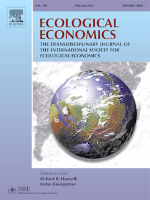
ECOLOGICAL ECONOMICS
Scope & Guideline
Empowering Research for Sustainable Environmental Policies.
Introduction
Aims and Scopes
- Interdisciplinary Research:
The journal promotes research that bridges various fields such as economics, ecology, sociology, and environmental science, fostering a comprehensive understanding of complex ecological-economic systems. - Sustainability and Policy Analysis:
A significant focus is on evaluating sustainability practices and policies, assessing their economic implications, and providing insights on how to achieve sustainable development goals. - Behavioral Insights and Decision-Making:
Research exploring human behavior in relation to environmental issues, including how psychological factors influence pro-environmental behaviors and decision-making processes. - Resource Management and Valuation:
Studies that analyze the economic valuation of ecosystem services, the sustainability of resource management practices, and the implications of resource use on ecological health. - Climate Change and Adaptation Strategies:
An emphasis on understanding the economic impacts of climate change and developing strategies for adaptation and mitigation, including policy recommendations to address climate-related challenges.
Trending and Emerging
- Circular Economy and Resource Efficiency:
A growing number of studies are focusing on circular economy principles, emphasizing resource efficiency, waste reduction, and sustainable production and consumption practices. - Social Equity and Environmental Justice:
Research addressing social equity and environmental justice is on the rise, exploring how environmental policies impact marginalized communities and the importance of inclusive practices in sustainability efforts. - Climate Change Adaptation and Resilience:
There is an increasing focus on adaptation strategies and resilience building in response to climate change, including community-based approaches and ecological restoration efforts. - Ecosystem Services Valuation:
Emerging themes include advanced methodologies for valuing ecosystem services, integrating economic valuation with ecological health assessments to inform policy and management. - Behavioral Economics and Sustainability:
An uptick in studies exploring the intersection of behavioral economics and sustainability, particularly how behavioral insights can drive pro-environmental actions and inform policy design.
Declining or Waning
- Traditional Economic Growth Models:
There is a noticeable decline in research focusing solely on traditional economic growth models, as the journal increasingly emphasizes sustainable and degrowth perspectives that challenge conventional growth paradigms. - Single-Dimension Environmental Policies:
Research that advocates for one-dimensional approaches to environmental policies, such as solely focusing on carbon emissions without considering broader ecological and social implications, is becoming less prominent. - Static Environmental Assessments:
There is a waning interest in static assessments of environmental impacts without integrating dynamic systems thinking, which reflects a growing recognition of the complexity of ecological interactions. - Narrowly Defined Ecological Economics:
The scope of ecological economics is expanding, leading to a decline in narrowly defined studies that do not incorporate interdisciplinary approaches or fail to connect economic and ecological systems. - Overemphasis on Technological Solutions:
The focus on technological solutions without addressing socio-economic factors and behavioral changes is decreasing, as the journal increasingly advocates for holistic approaches to sustainability.
Similar Journals

ENVIRONMENT AND DEVELOPMENT ECONOMICS
Shaping Policies for a Sustainable FutureEnvironment and Development Economics, published by Cambridge University Press, stands as a pivotal journal in the fields of development economics and environmental science. With a robust ISSN of 1355-770X and an E-ISSN of 1469-4395, this esteemed publication has been a significant contributor to scholarly discourse since its inception in 1996 and continues to thrive with a convergence of research insights expected to run until 2024. Distinguished by its Q1 status in Development and its Q2 rankings in both Economics and Econometrics and Environmental Science (Miscellaneous) for 2023, the journal reflects its commitment to high-impact research. Notably, it ranks 58th out of 306 in Social Sciences Development and maintains respectable standings in other categories, emphasizing its importance in shaping policies and practices at the intersection of economics and environmental sustainability. Researchers, professionals, and students engaged in these disciplines can access this journal for thought-provoking articles that advance understanding of economic development while addressing environmental challenges.
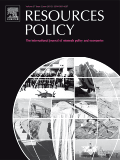
Resources Policy
Fostering Critical Discussions in Economics, Law, and SociologyResources Policy, published by ELSEVIER SCI LTD, is a prestigious journal that has been at the forefront of advancing knowledge in the fields of Economics, Law, and Sociology since its inception in 1974. With an impressive Q1 ranking in multiple disciplines—including Economics and Econometrics, Law, Management, Monitoring, Policy and Law, and Sociology and Political Science—this journal showcases high-impact research and insights that are vital for academics, policymakers, and practitioners alike. With Scopus rankings placing it in the top percentiles of its respective categories, Resources Policy fosters interdisciplinary dialogue, promoting innovative solutions and policies concerning the sustainable management and use of resources. While currently not an open-access publication, the journal ensures that its rich content is accessible to those pursuing rigorous research and professional excellence. As we approach its 50th anniversary in 2024, Resources Policy continues to be an essential platform for critical discussions, evaluation, and advancements in resource management.
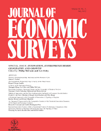
JOURNAL OF ECONOMIC SURVEYS
Catalyzing Knowledge in Economics and EconometricsJOURNAL OF ECONOMIC SURVEYS, published by WILEY, is a highly esteemed peer-reviewed journal dedicated to the field of economics and econometrics. With its distinguished position as a Q1 journal and a Scopus rank of #38 out of 716, the journal consistently showcases cutting-edge research that significantly contributes to the understanding and development of economic theories and practices. Since its inception in 1987, this journal has been a cornerstone for economists, providing vital surveys that systematically address contemporary issues and emerging trends within the discipline. Researchers and practitioners alike rely on the journal for its rigorous analysis and comprehensive reviews, making it an essential resource for anyone involved in economic research. Although the journal does not currently offer open access options, its exceptional impact and relevance in the field continue to engage a global audience of scholars and policymakers.

One Earth
Innovating solutions for planetary health and ecological integrity.One Earth is a premier academic journal published by Cell Press, dedicated to advancing research in the fields of Earth and Planetary Sciences as well as Environmental Science. With an impactful presence in the academic community and an impressive ranking, One Earth has achieved Q1 status in both Earth and Planetary Sciences and Environmental Science, showing its commitment to the highest standards of scholarly excellence. Founded in 2019, this journal has quickly established itself as a leading platform for groundbreaking research, contributing to the global conversation on sustainability and environmental stewardship. With a distinguished Scopus rank placing it in the 99th percentile among Earth and Planetary Sciences and the 97th percentile in General Environmental Science categories, One Earth aims to disseminate cutting-edge findings and foster innovative approaches to address pressing global challenges. The journal is indexed with an ISSN of 2590-3330 and an E-ISSN of 2590-3322, supporting a broad audience of researchers, professionals, and students passionate about ecological integrity and planetary health.
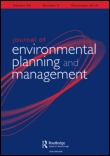
Journal of Environmental Planning and Management
Pioneering research for impactful environmental change.The Journal of Environmental Planning and Management, published by Routledge Journals, Taylor & Francis Ltd, is a leading academic journal dedicated to advancing the field of environmental science through innovative research and critical analysis. With a robust impact factor and categorized in Q1 across multiple disciplines, including Environmental Science, Geography, and Fluid Flow, this journal holds a prestigious position in the academic community. It serves as a vital platform for researchers, professionals, and students interested in the complexities of environmental management, policy, and planning, promoting insightful discourse on sustainable practices and innovative solutions. Although the journal does not currently offer Open Access options, it remains widely accessible through institutional subscriptions, ensuring that pertinent research reaches a broad audience. Since its inception in 1992, the journal has shown a commitment to excellence, making significant contributions to our understanding of environmental issues and the interplay between human activity and natural systems. The Journal of Environmental Planning and Management invites submissions that not only push the boundaries of existing knowledge but also foster interdisciplinary collaboration in the quest for sustainable development.

Lesnoy Zhurnal-Forestry Journal
Transforming Insights into Action for a Sustainable EnvironmentLesnoy Zhurnal-Forestry Journal is a prominent academic publication dedicated to advancing the field of forestry and environmental sciences. Published by the Northern Arctic Federal University M. V. Lomonosov, this journal focuses on innovative research, practices, and policies related to forestry management and conservation. With an Open Access model established since 2015, the journal ensures widespread dissemination of knowledge and foster collaborative research across global scholarly communities. Located in Arkhangelsk, Russia, the Lesnoy Zhurnal appeals to researchers, professionals, and students alike, providing a platform for sharing valuable insights and addressing emerging challenges in forestry. Though specific metrics like HIndex and Scopus rankings are presently unlisted, the journal is committed to excellence and aims to enhance its visibility and impact within the scientific community. This publication is not only a critical resource for ongoing research but a key player in shaping sustainable forestry practices in a rapidly changing environment, making it indispensable for anyone involved in forestry and environmental studies.

International Journal of Ecological Economics & Statistics
Unlocking Data-Driven Solutions for Environmental Challenges.The International Journal of Ecological Economics & Statistics is a critical platform for research in the intersecting fields of ecological economics and statistical analysis. Published by the CENTRE ENVIRONMENT SOCIAL & ECONOMIC RESEARCH (PUBL-CESER), this journal aims to promote scholarly discussion and knowledge dissemination regarding sustainable economic practices and quantitative research methodologies. Despite the discontinuation of its coverage in Scopus, the journal continues to play a significant role in enhancing the understanding of the economic aspects of environmental issues within a global context. Researchers and professionals engaged in the fields of economics, decision sciences, and environmental studies are particularly invited to contribute and stay updated with the latest findings and theories. With its commitment to fostering academic discourse, the journal aspires to bridge the gap between environmental sustainability and economic growth, equipping readers with essential insights for future applications.

GLOBAL JOURNAL OF ENVIRONMENTAL SCIENCE AND MANAGEMENT-GJESM
Exploring the intersections of science, management, and sustainability.Global Journal of Environmental Science and Management (GJESM), published under the distinguished leadership of Professor J. Nouri, is an esteemed academic platform dedicated to advancing the interdisciplinary discourse surrounding environmental science and management. With an ISSN of 2383-3572 and an E-ISSN of 2383-3866, GJESM has established itself as a prominent Open Access journal since 2014, allowing for unrestricted sharing of knowledge and research findings. Based in Iran, this journal caters to a diverse global audience, featuring contributions that span various critical domains including agricultural and biological sciences, environmental engineering, pollution management, and social sciences, evidenced by its impressive 2023 Q1 and Q2 quartile rankings across multiple categories. The journal’s Scopus rankings demonstrate a robust standing in the academic landscape, with exciting placements that underscore its relevance in key fields. By bridging the gap between scientific inquiry and practical application, GJESM serves as a vital resource for researchers, practitioners, and students seeking to understand and address the pressing environmental challenges faced by our planet today.
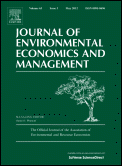
JOURNAL OF ENVIRONMENTAL ECONOMICS AND MANAGEMENT
Navigating the Nexus of Economics and Environment.JOURNAL OF ENVIRONMENTAL ECONOMICS AND MANAGEMENT, published by Academic Press Inc Elsevier Science, stands as a leading platform for scholarly discourse at the intersection of environmental economics and management. Established in 1974 and continuing through 2024, the journal targets key issues in environmental policy, management strategies, and economic implications of environmental challenges, catering to an extensive audience of researchers, professionals, and students. It boasts a prestigious Q1 ranking in both Economics and Econometrics and Management, Monitoring, Policy and Law for 2023, underscoring its significant contribution to the field. Additionally, with outstanding Scopus rankings—placed in the 88th percentile for Economics and Econometrics and the 82nd percentile for Environmental Science—the journal is recognized for its rigorous peer-reviewed research. Although it follows a subscription model, the insights gained from its comprehensive articles are invaluable for addressing today’s pressing environmental and economic challenges.

ENVIRONMENTAL MANAGEMENT
Championing impactful research in ecology and pollution.ENVIRONMENTAL MANAGEMENT, published by Springer, stands at the forefront of advancing sustainability and ecological stewardship in the fields of Ecology, Global and Planetary Change, and Pollution. With an impressive tracking history from 1977 to 2024 and prestigious quartile rankings reflecting its significant impact (Q1 in Ecology and Q2 in both Global and Planetary Change and Pollution), this journal engages a wide range of stakeholders, including researchers, policymakers, and environmental professionals. The journal is a vital resource for those dedicated to addressing pressing global environmental challenges, publishing rigorous interdisciplinary research that informs policy and practice. While it does not offer open access, its content remains accessible through institutional subscriptions. Located in the heart of New York, ENVIRONMENTAL MANAGEMENT is dedicated to fostering a substantive dialogue on innovative approaches to environmental preservation and management.